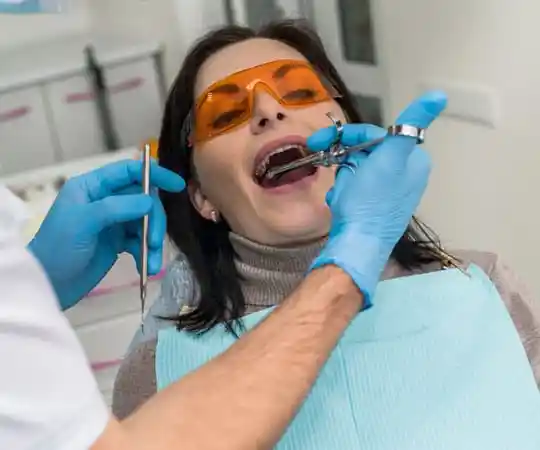Dental Anesthesia: What Is Local Anesthesia & Why it is used for Dental Numbing
Dental anxiety frequently troubles people but contemporary local anesthesia enables comfortable procedures with minimal discomfort. In local anesthesia dentistry, dentists numb a specific part of your mouth so you stay awake but feel no pain. It’s commonly used during fillings, tooth extractions, and root canals. The numbing effect works fast and wears off within a few hours. If you want to know how does anesthesia work, what medications are used, and how dental numbing helps, this blog has everything you need to feel informed before your next visit.
How Does Local Anesthesia Work?
Local anesthesia stops the feeling of pain from a targeted region in your mouth so you stay alert yet experience no discomfort. The dentist can perform treatments comfortably while you stay informed throughout your dental visit since the medicine blocks pain.
- Targeted Pain Relief: The medicine blocks pain signals at the nerve endings so you avoid feeling pain during your treatment.
- Conscious and Comfortable: Unlike sedation, you will stay conscious during your treatment, allowing you to interact with your dentist and understand the process.
- Fast-Acting: The anesthetic begins to work quickly and the effects wear off gradually after the treatment.
Local anesthesia is typically used for simple procedures like fillings, root canals, and extractions, where numbing a small area is all that’s needed.

Most Common Numbing Agents Used For A Local Anesthetic
Lidocaine is the most commonly used numbing agent during dental treatments. This fast-working numbing drug stays active for longer periods than other forms and suits most dental work.
Doctors most often use Lidocaine for dental blockages to reduce pain. The anesthetic help patients handle regular dental procedures and medical procedures such as fillings in teeth and root canal therapy. Dentists also use this anesthesia type for tooth extraction.
The numbing agent is injected directly into the treatment area, where it works to block the pain signals from the nerves. Your dentist will choose between two different ways to administer the numbing solution based on the dental procedure.
- Infiltration Injection: This type of injection numbs a small area around the specific site of treatment (e.g., for fillings).
- Block Injection works for heavier pain control since it treats large treatment spots especially during teeth extraction and root canal procedures.
Common Side Effects of Dental Local Anesthesia
Local anesthesia has minimal risks but some people report short-lasting side effects. Most side effects from this treatment become better without any special care after your treatment ends. Potential side effects include:
- Numbness: The numbing effect makes your lips gums and tongue feel unresponsive for only a few hours following the procedure.
- Headaches: Headaches appear most often in patients who receive nitrous oxide through the dental procedure.
- Heart Rate Increase: A small rise in heart rate can happen from anesthesia treatment though this sign goes away fast.
- Numbness Outside the Target Area: The numbing shuts off parts of your mouth beyond the injection site but this effect vanishes within several hours.
Dr. Uparika Sharma is highly experienced in administering local anesthesia and takes all precautions to ensure the procedure is as safe and comfortable as possible.
Find Out More About Local Dental Anesthesia
If you’re interested in learning more about local anesthesia or if you have specific concerns about your upcoming procedure, we encourage you to reach out to our office. Bellevue Azalea Dentistry is dedicated to providing the best dental care, including making sure you are comfortable and informed throughout your treatment.
Frequently Asked Questions (FAQs)
What Kind of Local Anesthesia Is Used in Dentistry?
Dental professionals choose Lidocaine as their preferred anesthetic medicine because it works well in making the treatment area unfeeling during dental procedures.
How Painful Is a Local Anesthesia Injection for a Dentist?
Most dentists use numbing gel prior to injecting local anesthesia because the shot itself is generally bearable.
How Safe Is Dental Local Anesthesia?
Local anesthesia is extremely safe. Side effects are rare, and your dentist will monitor your health to ensure the procedure goes smoothly.
Can You Get Local Anesthesia for Teeth Cleaning?
Regular teeth cleaning needs no local anesthetic treatment. Yes, for deep cleaning treatments when you need sensitive gum treatment dentist will opt for anesthesia but not during basic dental cleanings.
How Does Local Anesthesia Work in Dentistry?
During dental work local anesthesia prevents discomfort from nerves in the treated area but leaves you awake and alert.
Call today to schedule a consultation! (425) 998-8109
Call today to schedule a consultation!
(425) 998-8109

